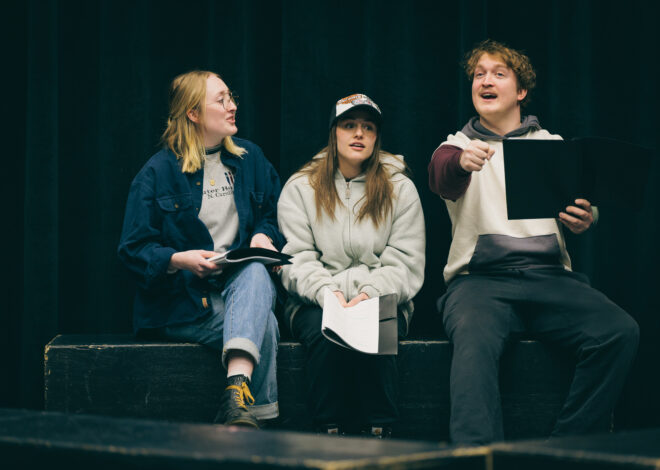‘Top Girls’ to premiere
The University of South Dakota theatre department will address the issue of inequality among men and women and the working class with a presentation of the play “Top Girls.”
“Top Girls” will be performed in the Wayne S. Knutson Theatre Feb. 22 through the 25 at 7:30 p.m. and Feb. 26 at 2:00 p.m. Tickets are $4 for USD students.
Assistant professor Raimondo Genna selected the play and is serving as the director. He said the play is set in England in the early 1980s, soon after Margaret Thatcher became prime minister.
“The central character, Marlene, has been promoted to the head of her agency,” Genna said. “The play focuses on the dilemmas and the pressures that women went through and are still going through in terms of succeeding in a world where gender equality is still a problem.”
Genna said although the play seems like a pro-feminist drama, Marlene is a conservative character.
“(Top Girls) looks at the tensions between the two sides of the coin and brings up questions of gender and class,” Genna said. “It’s about some of the choices that she had to make about succeeding that men didn’t necessarily face and her trying to deal with that.”
Junior Brooke Grassby will be playing the character of Marlene. She said Marlene takes on a lot of the characteristics of a man so that she can make it in a man’s world.
“She thinks she’s doing the right thing by being a strong woman, but really she just reinforces how men treat women,” Grassby said. “She ends up treating women like men would without realizing it. She doesn’t realize it until the end that she gave up a lot to get where she is now.”
Grassby said inequality among men and women is still a problem today and needs to be addressed.
“Just recently, women were allowed to fight on the front lines so obviously there’s still work being done for women to be on the same level as men,” Grassby said. “This play also shows how strong women can be, but it’s also a give and take. It’s hard to find the right middle to feel feminine and also feel strong in yourself.”
Senior Tarryn Rouse is playing three different characters and said “Top Girls” also discusses the issue of inequality in the work place and in society.
“It also focuses a lot on the equality of the working class and the upper class as well as the inequalities, too,” Rouse said. “When Margaret Thatcher was the prime minister in Britain she basically said that she didn’t believe in class and the lower class and working class were suffering quite a bit.”
The issue of equality is not the only reason students will find the play interesting, Genna said. Caryl Churchill, the playwright of “Top Girls,” is an incredibly important contemporary playwright, he said.
“As far as exposing our students to important contemporary playwrights, that was a big reason we wanted to bring this play to USD,” Genna said. “We face the ongoing question of ‘what is the role of women in society?’ We celebrate gender equality, but at the same time we need to confront issues that men aren’t forced to confront.”
Genna said although the play is set in the past and in England, it is very much relevant to the political discussions had today without really laying it on heavy.
“The play deals with issues that apply particularly to the female students, but also the male students,.They will be forced to confront these issues especially when they go out into the job market,” Genna said. “There are still some fundamental issues that have not really worked themselves out yet and the play speaks to the students in terms of what lies before them in the future.”
Grassby said students might be intimidated about going to see this play because it does not have a ‘laugh out loud’ funny element. Grassby said there are entertaining parts throughout that the audience can laugh about.
“Top Girls” gives the audience a chance to see another culture because it is a British play, Rouse said.
“It has a very interesting theme, it’s very entertaining and it’s something that you can learn something from,” Rouse said. “It will teach the audience something.”
Reach reporter Emily Niebrugge at

